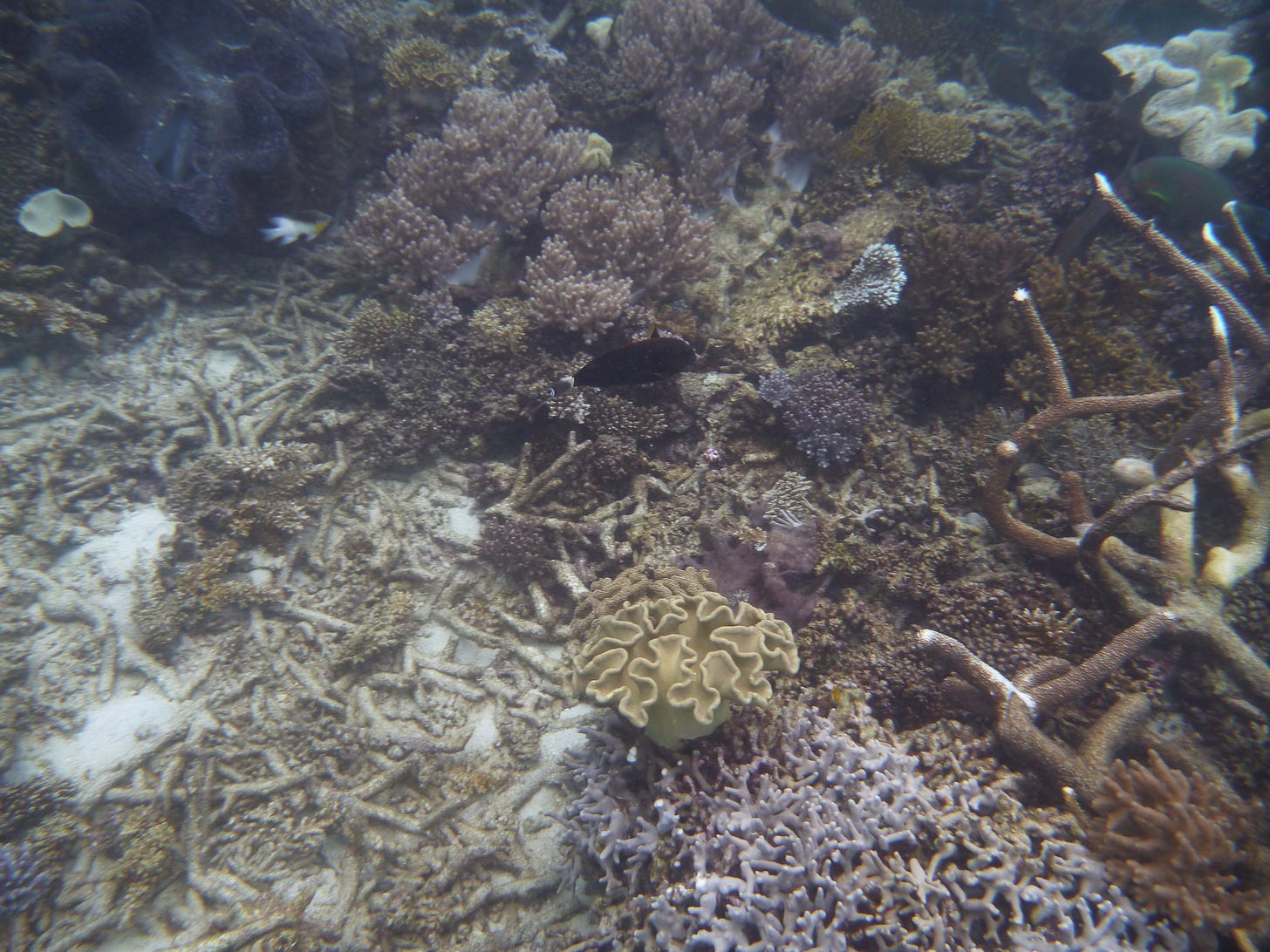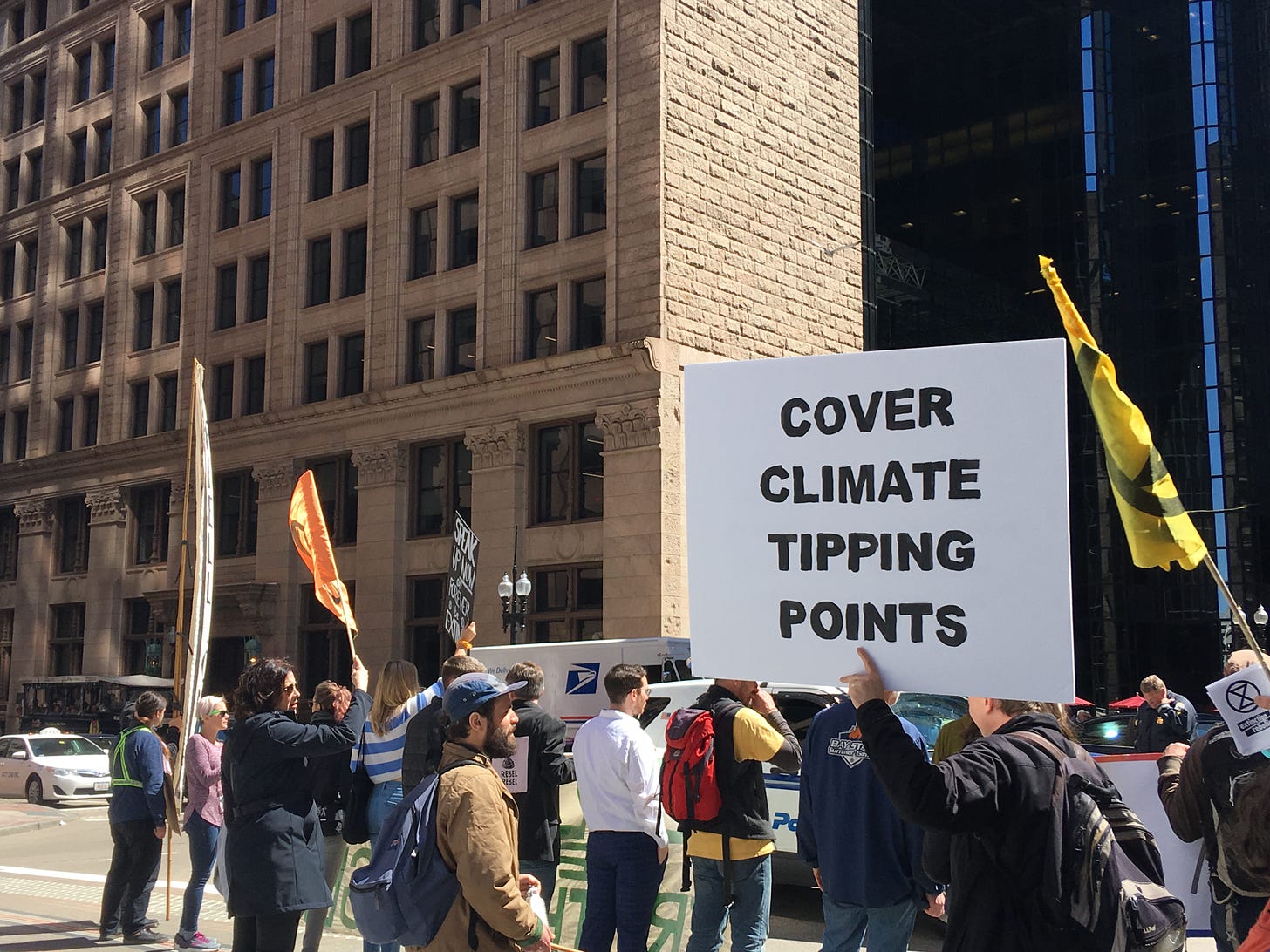(Halloween Edition) Earth is On a Terrifying Trajectory of Crossing or Nearing Tipping Points
A grim “new reality” is here where unchecked global heating may lead to irreversible and catastrophic consequences.
Coral reefs are experiencing widespread bleaching and unprecedented dieback, and a new report warns they have already reached a tipping point where extensive reef loss may now be irreversible, “impairing the livelihoods of hundreds of millions who depend on them.”
There is no sugarcoating it. As several new scientific reports point out, we are in the “beginning of a grim new chapter for life on Earth,” a “new reality” in which the planetary systems that support life and our human civilization are rapidly destabilizing. The grave consequences are already starting to unfold, with widespread disease, destruction, disruption, and death. The Lancet Countdown on Health and Climate Change report released this week warns that climate inaction is already costing millions of lives each year.
“This year’s health stocktake paints a bleak and undeniable picture of the devastating health harms reaching all corners of the world—with record-breaking threats to health from heat, extreme weather events, and wildfire smoke killing millions,” Dr. Marina Romanello, Executive Director of The Lancet Countdown at University College London, said in a news release. “The destruction to lives and livelihoods will continue to escalate until we end our fossil fuel addiction.”
Since Halloween is upon us, it seems fitting to examine some new reports and warnings from climate and Earth system scientists that are, frankly, quite horrifying.
Seven of Earth’s nine “planetary boundaries” have now been crossed, according to the Planetary Health Check report issued last month. This report, which provides an updated assessment on the overall health of the planet, like an annual checkup you get from your doctor, defines these boundaries as “processes that are known to regulate the stability, resilience and life-support functions of our planet.” Breaching them suggests that our society is operating in the “danger zone,” with consequences for our health, security, economies, and survival.
New this year, the report finds that the planetary boundary for ocean acidification has been breached for the first time. “This intensifying acidification stems primarily from fossil fuel emissions, and together with warming and deoxygenation affects everything from coastal fisheries to the open ocean,” explained Levke Caesar, one of the lead authors of the report. “The consequences ripple outward impacting food security, global climate stability, and human wellbeing.”
Our oceans are not only acidifying, but also rapidly warming. Coral reefs are now experiencing “unprecedented dieback” – and have already breached their thermal tipping point. The Global Tipping Points Report published just a few weeks ago finds that this is just the first of multiple Earth system tipping points that may be crossed in the coming years. Tipping points are basically thresholds that, once breached, trigger large and likely irreversible changes. They are, in my view, probably the most terrifying aspect of climate breakdown, suggesting a kind of point of no return.
As the report explains, these Earth system thresholds are interconnected, so crossing one increases the chances of crossing others. “The resulting impacts would cascade through the ecological and social systems we depend upon, creating escalating damages,” the report states. “Humanity faces a potentially catastrophic, irreversible outcome.”
We are basically breaking the planet. Beyond coral reefs, we may see the disappearance of glaciers and polar ice sheets, Amazon rainforest dieback, and even the collapse of key ocean current systems.
“This is a heartbreaking loss,” 350.org executive director Anne Jellema said in reaction to the report’s indication that coral reefs have crossed their tipping point. “Future generations will inherit empty seas where magical kaleidoscopes of life once thrived. This irreversible collapse is a preview of what we’re about to lose next: rainforests, glaciers, entire species.”
Demonstrators from Extinction Rebellion outside the Boston Globe office urging the media to “tell the truth on the climate emergency” and cover climate change tipping points.
As One Earth Now has previously reported, the Atlantic meridional overturning circulation, a key ocean current system, is weakening and may be at risk of collapse – which would result in major and irreversible climate disruptions.
The Greenland and West Antarctic ice sheets are rapidly degrading and may have already crossed tipping points (where ice loss becomes irreversible), potentially committing the planet to several meters of sea level rise.
These and other deeply concerning trends are summarized in the 2025 State of the Climate Report published this week in the journal BioScience. (For a recap of the 2024 report, see here). The report, authored by a coalition of international scientists, finds that 22 out of 34 planetary “vital signs” are at record levels, suggesting the world is, as the scientists put it, “hurtling toward climate chaos.”
Global surface temperature, atmospheric greenhouse gas concentrations, ocean heat content and acidity, loss of ice mass, and fire-related tree cover loss are all at record levels. Warming is likely accelerating, and there is a risk of a “hothouse Earth” trajectory in which self-reinforcing feedback loops are triggered that result in continuous global heating. Such a scenario, the scientists warn, would have “devastating impacts on natural systems and humanity.”
Renewable solar and wind energy use reached a record high in 2024, but so did fossil fuel consumption. Fossil fuels still dominate the global energy mix, and their consumption last year was 31 times greater than solar and wind.
Fossil fuels are the largest driver of the climate crisis, which is supercharging extreme weather events that are becoming more frequent, more intense, and more costly. A brand-new study from climate attribution researchers finds that climate change made Hurricane Melissa – the category 5 storm that ravaged Jamaica this week – about four times more likely.
The accelerating climate crisis is an “unfolding emergency” and is “now a major driver of global instability,” the authors of the latest state of the climate report observe. They say this is “the beginning of a grim new chapter for life on Earth.”
While the window of time remaining to avert the worst outcomes is “rapidly closing,” scientists emphasize that action still matters and that every fraction of a degree of warming avoided is critical.
“What’s urgently needed are effective climate mitigation and adaptation strategies, including ones that embed climate resilience into national defense and foreign policy frameworks,” said William Ripple, distinguished professor in the Oregon State University College of Forestry and lead author of the state of the climate report. “We also need grassroots movements advocating for a socially just phaseout of fossil fuels and limits on the fossil fuels industry’s financial and political influence.”
The Global Tipping Points report does highlight what it calls some “positive tipping points,” like the rapid deployment of clean energy technologies – solar, wind, and electric vehicles. “There has also been contagious spread of climate litigation cases, nature regeneration initiatives, together with the emergence of more sustainable patterns of consumption and production in food and fiber supply chains,” the report states. “Despite recent backsliding on commitments in some nations and sectors, a minority can still positively tip the majority, generating self-amplifying change in societies, economies and technologies.”
These positive changes and socio-economic transformations are urgently needed. It is now or never.



